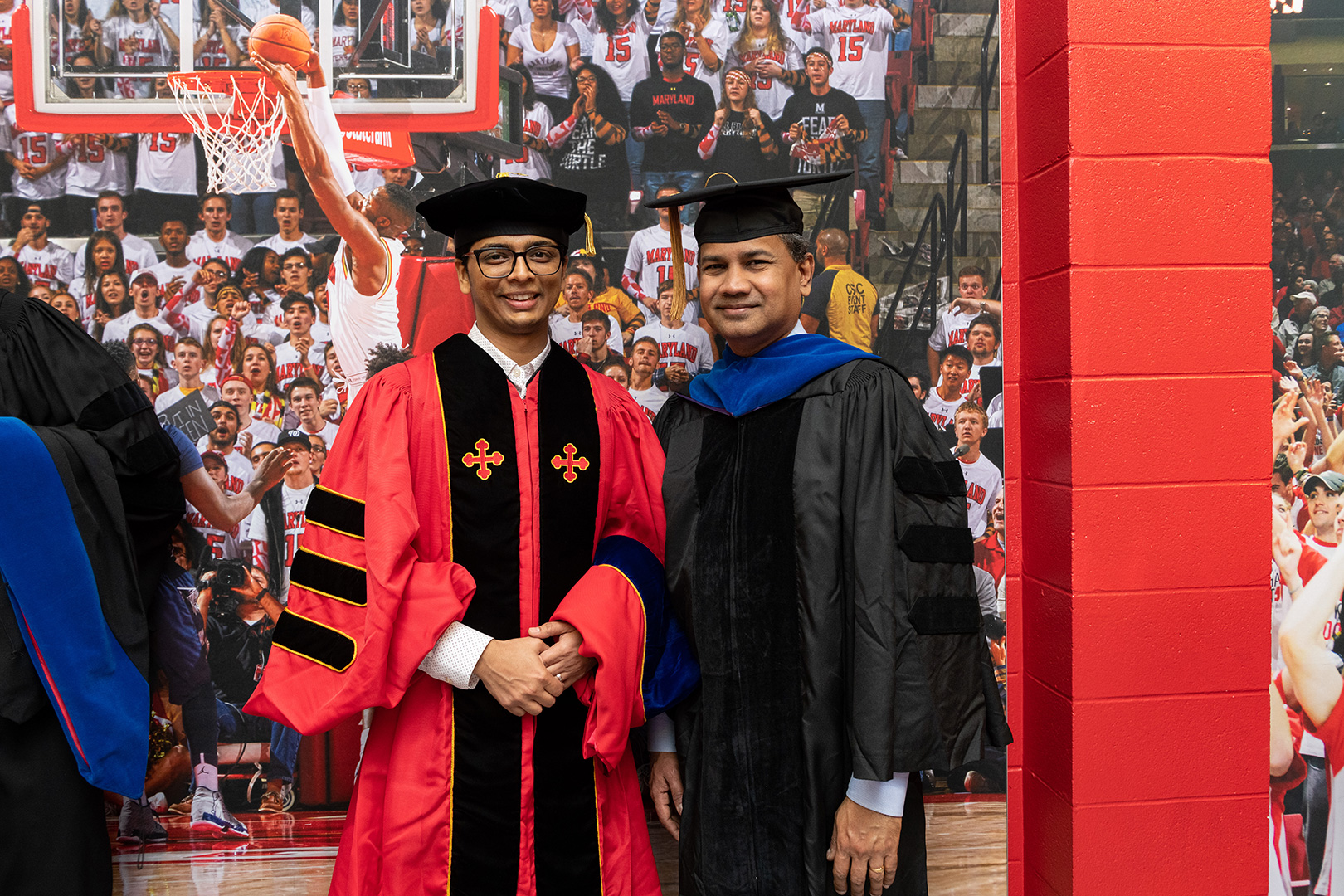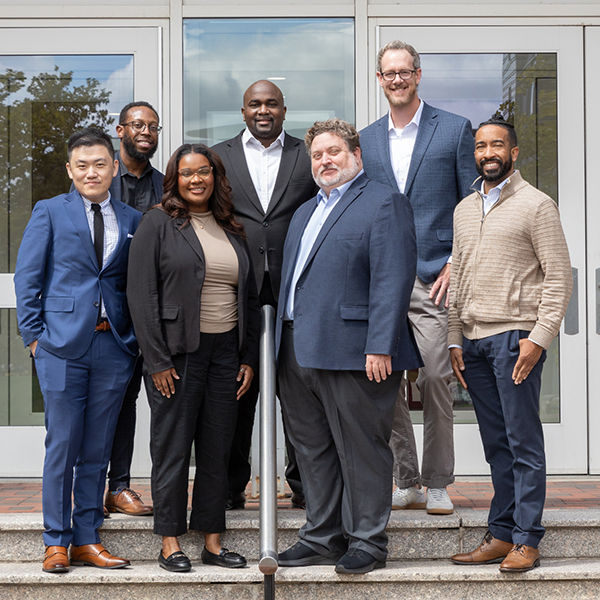Doctor of Business Administration
Unleash your potential with a Smith DBA.
 If you are passionate about your field of expertise, the Smith Doctor of Business Administration (DBA) is a terminal business degree that opens up opportunities to publish, speak, consult and teach.
If you are passionate about your field of expertise, the Smith Doctor of Business Administration (DBA) is a terminal business degree that opens up opportunities to publish, speak, consult and teach.
In the Smith DBA program, you'll develop competence in applied research, including demonstrating knowledge of relevant theory and scholarly literature. You’ll then go on to create new knowledge about modern business problems.
This rigorous program has been designed to maximize a candidate’s expertise and effectiveness in an area of specialization. Our world-renowned faculty work directly and closely with this small and select group of research-minded practitioners each year. We accept students who wish to specialize in marketing, information systems, management, or a custom specialization in areas such as finance and accounting, to be determined by the research interests of the student.
Program Structure
- 54 credits, taken over three years
- Part-time, minimizing interruptions to your career
- In-person, allowing you to benefit from a close connection to both faculty and fellow DBA students
- Convenient, meeting three days each month: two Fridays from 2 p.m. to 7 p.m., and one Saturday each month from 8:30 a.m. to 2 p.m.
- Rigorous, with two summer research projects and a year 3 research capstone project

Who Is a Good Fit for This Program?
The ideal DBA candidate:
- Has a master’s degree in business administration or a related field
- Has significant career experience and expertise in their field
- Is intellectually curious
- Is passionate about doing research
- Is interested in rigorously investigating practical challenges in modern business, and using insights derived from data to drive strategic solutions
Curriculum
The DBA curriculum is carefully curated to be practice-focused, with segments in research methodology, analytics, legal and ethical issues in big data management, and regulatory structure.
Students will take 42 credits in the following categories: Research Tools and Methodologies (10–12 credits), courses in the student’s major field of study (22–24 credits), and practice-focused elective courses (10–12 credits). All students must complete 12 credits of the capstone project research in addition to the coursework for graduation eligibility.
Sample Coursework
Year 1
Fall – I (9 credits)
- BDBA 809: Research Foundations: Introduction to Research Theory and Methods (3) (weekend, in-person, DBA-only)
- BDBA 820: Research Foundations: Economics for Business Research (3) (weekend, in-person, DBA-only)
- BDBA 810: Research in Business I (M&O and marketing) (3) (weeknight online, DBA-only)
Spring – I (9 credits)
- Research Foundations: Quantitative Research Methods (3) (weekend, in-person, DBA-only)
- Business Research Lab (3) (weekend, in-person, DBA-only)
- Research in Business II (finance and IS research) (3) (weeknight online, DBA-only)
Summer I (3 credits)
- Independent Research Study (3)
Year 2
Fall – II (9 credits)
- BDBA 806: Executive Decision-Making in the Age of AI (3) (weekend, DBA-only)
- Area-Specific Course 1 (2) (in person or online, MS or MBA courses)
- Area-Specific Course 2 (2) (in person or online, MS or MBA courses)
- Area-Specific Course 3 (2) (in person or online, MS or MBA courses)
Spring – II (9 credits)
- Business Research Lab (3) (weekend, in-person, DBA-only)
- Area-Specific Course 1 (2) (in person or online, MS or MBA courses)
- Area-Specific Course 2 (2) (in person or online, MS or MBA courses)
- Area-Specific Course 3 (2) (in person or online, MS or MBA courses)
Summer II (3 credits)
- Independent Research Study (3)
Year 3
Fall – III (6 credits)
- Capstone Research Project (6) (custom)
Spring – III (6 credits)
- Capstone Research Project (6) (custom)
Areas of Specialization
The DBA program currently offers four areas of specialization: Information Systems, Management & Organization, Marketing, and a Custom Option, which gives students the flexibility to create unique concentrations that would align with the research focus areas of our faculty. Developed in response to evolving demands in the business world, these specializations will elevate Smith DBAs to be prominent leaders of their respective industries.

Business analytics expertise with an expansion on project management.

Marketing analytics and consumer behavior from an industry and management perspective.

Human behavior at the individual and organizational levels and its impact on organizational outcomes.

For the custom specialization, students develop work aligned with faculty in other areas such as finance, accounting or supply chain management.
Smith Faculty
Smith faculty are influential thought leaders, consistently pushing the boundaries of business knowledge and bringing unparalleled insights to the classroom. You will work closely with faculty and your advisor throughout your DBA experience, adding them to your lifelong network.
Featured Program Faculty
Experience a truly transformative educational experience with the research-driven curriculum and personalized mentorship of the Smith DBA program.
Information Systems

Tejwansh (Tej) Singh Anand

Il-Horn Hann




Siva Viswanathan
Marketing

Judy Frels




Jie Zhang

Management & Organization

Sheetal Singh




Admissions
- Cover letter (please submit as Description of Research/Work Experience in the application)
- Statement of purpose
- Resume or curriculum vitae
- Official transcripts of undergraduate degree and any graduate-level degrees if applicable
- GMAT/GRE test scores: optional
- Marketing: 2 letters of recommendation; IS: 3 letters of recommendation
Visa Eligibility: International students, please note — this program is not eligible for F-1 or J-1 student visas. The University of Maryland cannot issue an I-20 or DS-2019 form for this program.
- October 1, 2025
- November 1, 2025
- December 15, 2025
- January 15, 2026
- March 13, 2026
- April 30, 2026
Visa Eligibility: International students, please note — this program is not eligible for F-1 or J-1 student visas. The University of Maryland cannot issue an I-20 or DS-2019 form for this program.
Our program is projected to cost approximately $150,000 plus university mandatory fees for three years. The program charges per credit during traditional semesters.
Schedule a one-on-one consultation to receive individualized feedback on your candidacy, or schedule your visit to a DBA class.
Contact Us
For all inquiries about the DBA, contact DBAadmissions@umd.edu. An admissions officer will be able to assess your candidacy and provide further information about the DBA program. Please provide a brief description of the following information in your email inquiry:
- Education background
- Work experience
- Why are you interested in pursuing a DBA degree and how does it relate to your career objectives?